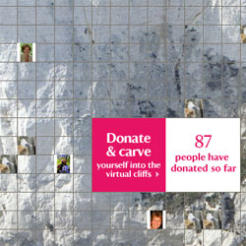The National Trust has launched an appeal to raise £1.2m to protect a famous stretch of Kentish coastline, the White Cliffs of Dover.
The charity launched the appeal today and must raise the sum by the year’s end. The money will be used to maintain the 1.34km strip overlooking the port of Dover and ensure public access.
The National Trust has a cross-media approach to the campaign, with appeal letters and emails arriving in the letterboxes and inboxes of existing supporters and people who have donated to the charity’s long-running coastal Neptune appeal today. Major donors and other organisations are also being approached for support.
The web is a large element of the campaign. The National Trust is encouraging donors to give online to the appeal, entering online donors in a prize draw to win tours of the site. Supporters are also asked to ‘carve their name’ into virtual White Cliffs. All online donors can upload a picture, message and their name onto a grid picture of the national icon and are encouraged to share their action on social media. The number of donors carving their name on the wall has been rising slowly but steadily all morning.
To keep the momentum of the campaign alive, a spokesman said the charity has planned three or four key moments throughout the year. There will be a reminder moment in late July, and a writer in residence will set up in Dover in August and will blog, tweet, release podcasts and an e-book about what the coast means to Britain but linking heavily to the White Cliffs site.
The appeal will also feature in the National Trust’s autumn magazine.
Dame Fiona Reynolds, director general of the National Trust, said there is an urgent need to protect the site: "If we don’t raise the money then the future of the White Cliffs is uncertain and this stretch of coastline might one day be disrupted by inappropriate management or development,” she said.









